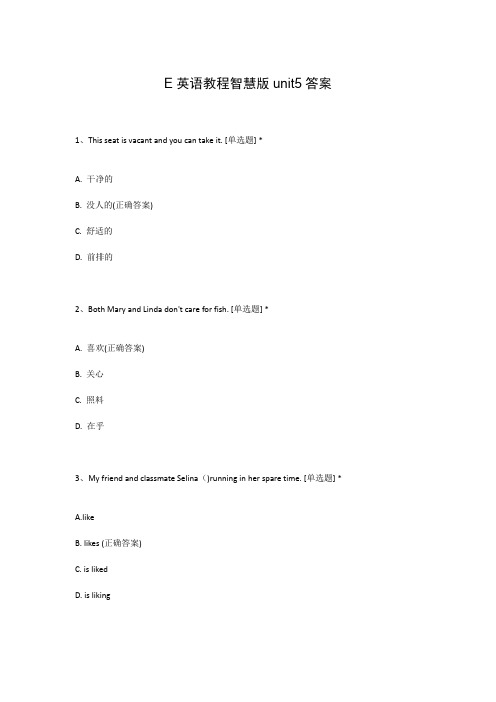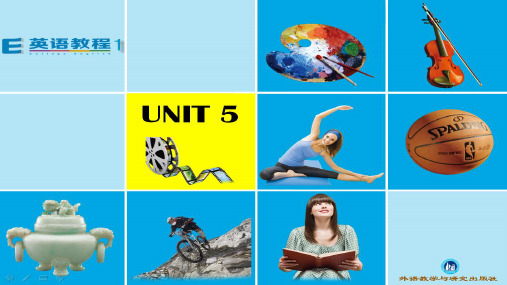e英语教程Unit 5
E英语教程智慧版unit5答案

E英语教程智慧版unit5答案1、This seat is vacant and you can take it. [单选题] *A. 干净的B. 没人的(正确答案)C. 舒适的D. 前排的2、Both Mary and Linda don't care for fish. [单选题] *A. 喜欢(正确答案)B. 关心C. 照料D. 在乎3、My friend and classmate Selina()running in her spare time. [单选题] *A.likeB. likes (正确答案)C. is likedD. is liking4、I’d like to go with you, ______ I’m too busy. [单选题] *A. orB. andC. soD. but(正确答案)5、Boys and girls, _______ up your hands if you want to take part in the summer camp(夏令营).[单选题] *A. puttingB. to putC. put(正确答案)D. puts6、He doesn’t smoke and hates women _______. [单选题] *A. smokesB. smokeC. smokedD. smoking(正确答案)7、If you do the same thing for a long time, you'll be tired of it. [单选题] *A. 试图B. 努力C. 厌倦(正确答案)D. 熟练8、Chinese people spend _____ money on travelling today as they did ten years ago. [单选题] *A. more than twiceB. as twice muchC. twice as much(正确答案)D. twice more than9、( ) --------Please take my seat here.-------- __________________________. [单选题]*A. That is nice of you(正确答案)B. I think it is my seatC. No, you sit hereD. I don’t think it’s a good seat.10、_______ a busy afternoon! [单选题] *A. HowB. What(正确答案)C. WhichD. Wish11、What _______ would you like, sir? [单选题] *A. otherB. else(正确答案)C. othersD. another12、We are looking forward to _______ you again. [单选题] *A. seeB. sawC. seeing(正确答案)D. seen13、—______ do you play basketball?—Twice a week.()[单选题] *A. How often(正确答案)B. How muchC. How manyD. How long14、_____ the plan carefully,he rejected it. [单选题] *A. To have consideredB.To considerC. Having considered(正确答案)D. Considering15、____ China is ____ old country with ____ long history. [单选题] *A. /, an, a(正确答案)B. The, an, aC. /, an, /D. /, the, a16、I walked too much yesterday and ()are still aching now. [单选题] *A. my leg's musclesB. my leg muscles(正确答案)C. my muscles' of legD. my legs' muscles17、Wang Dong usually gets up at 6:00 _______ he can catch the early school bus. [单选题] *A. as ifB. so that(正确答案)C. untilD. after18、I don't know the man _____ you are talking about. [单选题] *A. who'sB. whose(正确答案)C. whomD. which19、Bill Gates is often thought to be the richest man in the world. _____, his personal life seems not luxury. [单选题] *A. MoreoverB. ThereforeC. However(正确答案)D. Besides20、I like the food very much.It is _______. [单选题] *A. terribleB. expensiveC. delicious(正确答案)D. friendly21、The story has _______ a lot of students in our class. [单选题] *A. attracted(正确答案)B. attackedC. appearedD. argued22、—______ pencils are these?—They are Tony’s.()[单选题] *A. WhatB. WhereC WhoD. Whose(正确答案)23、In crowded places like airports and railway stations, you___ take care of your luggage. [单选题] *A. canB. mayC. must(正确答案)D. will24、E-mail is _______ than express mail, so I usually email my friends. [单选题] *A. fastB. faster(正确答案)C. the fastestD. more faster25、38.—Do you have ________else to say for your mistake?—________but sorry. [单选题] * A.anything; SomethingB.something; EverythingC.anything; Nothing(正确答案)D.something; Anything26、75.Why not________ for a walk? [单选题] *A.go out(正确答案)B.to go outC.going outD.goes out27、31.That's ______ interesting football game. We are all excited. [单选题] *A.aB.an(正确答案)C.theD./28、The managing director took the()for the accident, although it was not his fault. [单选题] *A. GuiltB. charge(正确答案)C. blameD. accusation29、Just use this room for the time being ,and we’ll offer you a larger one _______it becomes available [单选题] *A. as soon as(正确答案)B unless .C as far asD until30、The organization came into being in 1 [单选题] *A. 开始策划B. 进行改组C. 解散D. 成立于(正确答案)。
e英语教程2unit5

e英语教程2unit51. Aroundand around we go, laughing and nodding to the other dancers.我们跳了一圈又一圈,不时地向其他舞者笑着点头致意。
nod at / to sb.: 向某人点头e.g.Henodded to us and said, "Nice weather we're having."他冲我们点点头,说道:“天气真不错。
”aroundand around we go为倒装句,方位状语放在句首。
---正常语序为We go around and around.laughingand nodding to the other dancers为现在分词短语作伴随状语。
2Aswe continue to dip and sway, I remember a time when I was almost four, and myfather came home from work, swooped me into his arms and began to dance mearound the table.我们继续着舞步,这时我想起在我四岁那年,父亲下班回到家,一把将我搂在怀里,围着桌子开始跳舞。
dip:v. to go down 下降;下落e.g.The sun dipped below the horizon.太阳落到了地平线下。
swoop: v. to seize or snatch sth. in one sudden movement一下子抓住e.g.She rushed after the child and swoopedhim up in her arms.她在孩子的身后追赶着,一下子把他抱在了怀里。
3Onenight when I was 15, lost in some painful, adolescent mood, my fatherput on a stack of records and teasedme to dance with him.我十五岁那年的一个晚上,由于青春期的多愁善感,我非常悲伤。
中国文化英语教程unit5

中国文化英语教程unit5Unit 5: Traditional Chinese FestivalsIn this unit, we will explore the rich and vibrant traditional festivals in Chinese culture. These festivals not only have a long history but also reflect the values and beliefs of the Chinese people.1. Spring Festival: Also known as Chinese New Year, it is the most important and widely celebrated festival. Families come togetherto have reunion dinners, set off firecrackers, and exchange red envelopes filled with money to bring good luck and fortune for the upcoming year.2. Lantern Festival: This festival marks the end of the Spring Festival celebrations. People light up lanterns and participate in various activities such as solving lantern riddles and enjoying lion and dragon dances.3. Dragon Boat Festival: Held on the 5th day of the 5th lunar month, this festival is celebrated through dragon boat races and the consumption of sticky rice dumplings called zongzi. These activities are meant to commemorate the ancient poet Qu Yuan, who drowned himself in the river.4. Mid-Autumn Festival: Known as the Moon Festival, it is a time for families to appreciate the full moon and enjoy mooncakes together. Mooncakes are round pastries filled with various sweet or savory fillings, symbolizing unity and completeness.5. Double Ninth Festival: Celebrated on the 9th day of the 9thlunar month, this festival is also known as the Chongyang Festival. On this day, people climb mountains, wear dogwood, and drink chrysanthemum wine to pray for good health and longevity.6. Qingming Festival: Also called Tomb-Sweeping Day, it is a time for people to visit ancestors' graves, clean the tombstones, and make offerings of food and flowers. This festival is about honoring and remembering the deceased.7. Winter Solstice Festival: Celebrated on the shortest day of the year, it is a day for families to gather and eat tangyuan, a sweet glutinous rice ball. The festival represents the arrival of winter and the importance of family unity.Throughout the year, these traditional festivals bring people together, strengthen family bonds, and provide opportunities for people to reconnect with their roots and cultural heritage. They play a significant role in shaping Chinese identity and fostering a sense of community.。
E英语教程(第二版)1教学课件U5

E英语教程(第二版)1教学课件U5课程简介本节课将以E英语教程(第二版)1教学课件U5为主题,教授学生关于Unit 5的英语知识。
本单元的主要内容包括家庭成员、谈论家庭关系、描述家庭成员的外貌和性格特征等。
通过本节课的学习,学生将能够掌握相关词汇和句型,提高听说读写的能力。
课程目标1.学习家庭成员的英文表达;2.学习描述家庭成员的外貌和性格特征;3.提高听说读写的能力;4.提高学生的英语交流能力。
课程内容1. 家庭成员的英文表达•家庭成员的基本词汇:father, mother, brother, sister, etc.•家庭成员的扩展词汇:grandfather, grandmother, uncle, aunt, cousin, etc.2. 谈论家庭关系•表达亲属关系的词汇:parents, children, siblings, etc.•描述家庭关系的句型:My father is my mother’s husband. My brother is my sister’s sibling.3. 描述家庭成员的外貌和性格特征•描述外貌特征的词汇:tall, short, slim, overweight, etc.•描述性格特征的词汇:friendly, outgoing, serious, funny, etc.•描述家庭成员外貌和性格特征的句型:My father is tall and serious. My sister is short and funny.课堂活动1.情景对话:学生分组进行家庭成员和家庭关系的对话练习,使用学过的词汇和句型。
2.描述练习:学生通过看图片或老师给出的提示,描述家庭成员的外貌和性格特征,进行口语练习。
3.写作练习:学生根据提示,写一篇关于自己家庭的文章,包括家庭成员的介绍和他们的外貌和性格特征。
自主学习任务1.阅读教材对应单元的课文,理解并掌握相关的词汇和句型;2.通过影视、音频等资源,进一步了解家庭成员和家庭关系的表达方式;3.多听多讲多读多写,提高英语语感和口语表达能力;4.课后复习,做相关练习题巩固所学知识。
e英语教程1Unit 5

Pronunciation and listening skills
Listen to some words and put them into corresponding columns according to their stress patterns.
Tips 在英语双音节词或多音节词中, 有一个音节要重读, 这个音节就是重读音 节, 其他音节要弱读, 叫弱读音节或非重读音节。音标中重读音节前要加 重音符号’。如: happy/'hæpi/, hotel/həʊ'tel/。重读音节需要读得重而强, 而弱读音节则要读得轻而弱。
guitar
boyfriend dangerous homework
tomorrow
polite airport umbrella
yesterday hospital along
●●(双音节词,重音在第 ●●(双音节词,重音在第 ●●●(三音节词,重音在第一 ●●●(三音节词,重音在第
一个音节)
二个音节)
,pre-,per-,pro-,trans- 等前缀的词,重音一般放在第二个音节上。如: a'bout,be'lieve,de'cide,re'ceive,re'spect,in'form,im'press,en'joy, em'ploy,e'scape,con'fer,com'pare,di‘scuss,mi’stake,pre'pare,per'mit, pro'duce,trans'late。 3)有 re-,in-,con-,pre-,de-,im-,pro-,ob- 等前缀的词,其重音与词义和词 类有关, 一般名词的重音在第一个音节上,动词的重音在第二个音节上。如: 'record (n.)—re'cord (v.),'insult (n.)—in'sult (v.),'conduct (n.)—con'duct (v.), 'present (n.)—pre'sent (v.),'desert (n.)—de'sert (v.),'import (n.)—im'port (v.), 'produce (n.)—pro'duce (v.),'object (n.)—ob'ject (v.)。
E时代大学英语视听说教程2课件及答案 Unit 5

1. A. They are both anxious to try Italian food.
B. They are likely to have dinner together.
C. The man will treat the woman to dinner tonight.
D. The woman refused to have dinner with the man. 2. A. With cream. B. With sugar. C. With cream and sugar.
questions. Listen carefully and take down some necessary notes if possible and choose the best answer from the four possible choices.
1. A. On the way to a restaurant.
C. Jane orders a cup of beer and Bob doesn’t want to drink it at all.
D. Bob likes eating in this restaurant because the food here is delicious and not too
have been used to flavor it 辛辣的
recommend [rekə'mend] v. to tell someone that something is good or
useful, or that someone would be suitable for a
particular job, etc. 推荐,介绍
E英语教程Book3 Unit-5课堂课件

2. Which is better, package tour or a tour you organize and book yourself? Why?
a) I prefer a package tour, because it is a lot easier than the self-planned tour. The package tour operator plans the trip and does all the necessary reservations. What we need to do is just to follow the itinerary.(旅行计划/行程) b) I prefer a self-planned tour, because I like doing all the organizing myself. It gets me all excited. I just like being able to plan my own itinerary, decide and plan for myself all the things I will see and do.
2. W: I left my purse in the taxi! My passport was in that purse. Do you know how to report a missing passport? M: You need to contact the embassy right away. They will be able to help you replace your passport. Q: What does the woman want to know?
Discuss the following questions . 1. Do you like traveling?
e英语教程2unit5原文翻译

e英语教程2unit5原文翻译摘要:1.概述英语教程2unit5 的内容2.原文翻译的注意事项3.翻译的具体步骤和方法4.翻译实践和分析5.总结和建议正文:一、概述英语教程2unit5 的内容英语教程2unit5 是英语学习中的一个重要单元,主要涉及日常交际用语和场景,包括问候、介绍、道别等。
通过学习这个单元,可以让学习者更好地理解和掌握英语交际的基本规则和技巧,提高英语口头表达能力。
二、原文翻译的注意事项在进行原文翻译时,需要注意以下几点:1.理解原文含义:在翻译之前,首先要对原文进行深入的理解,把握原文的语境和含义。
2.保持语言的准确性和通顺性:翻译时要尽可能保持原文的语言特点和风格,同时要保证翻译的准确性和通顺性。
3.注意语法和词汇的转换:在翻译时,需要对原文的语法和词汇进行适当的转换,使之符合目标语言的语法规则和表达习惯。
三、翻译的具体步骤和方法翻译的具体步骤和方法可以分为以下几步:1.理解原文:仔细阅读原文,理解原文的含义和语境。
2.确定翻译策略:根据原文的语境和含义,确定翻译策略,包括词汇的选择、语法的转换等。
3.进行翻译:按照确定的翻译策略,进行翻译。
4.检查和修改:翻译完成后,要对翻译结果进行检查和修改,保证翻译的准确性和通顺性。
四、翻译实践和分析以英语教程2unit5 中的一段原文为例,进行翻译实践和分析。
原文:Hello, nice to meet you.My name is John.翻译:你好,很高兴认识你。
我的名字是约翰。
分析:在翻译时,我们首先理解了原文的含义和语境,然后确定了翻译策略,包括词汇的选择和语法的转换。
最后,我们进行了翻译,并检查和修改了翻译结果,保证了翻译的准确性和通顺性。
五、总结和建议总结:英语教程2unit5 的学习,可以让学习者更好地理解和掌握英语交际的基本规则和技巧,提高英语口头表达能力。
在进行原文翻译时,需要注意理解原文含义、保持语言的准确性和通顺性、注意语法和词汇的转换等。
- 1、下载文档前请自行甄别文档内容的完整性,平台不提供额外的编辑、内容补充、找答案等附加服务。
- 2、"仅部分预览"的文档,不可在线预览部分如存在完整性等问题,可反馈申请退款(可完整预览的文档不适用该条件!)。
- 3、如文档侵犯您的权益,请联系客服反馈,我们会尽快为您处理(人工客服工作时间:9:00-18:30)。
mountain _b_o__y_fr_i_e_n_d_ __a__ir_p_o__r_t _ _h_o_m__e__w_o__rk
guitar polite
__________
___a_l_o_n_g___
__________
yesterday __h_o__s_p_i_t_a_l _d_a_n__g_e_r_o_u_ s
英语单词的重读规律: 1 双音节词
1)重读一般放在第一音节上 e.g. 'apple,'carry, 'problem
Listening and speaking Reading
Grammar
Writing
Culture express
Distinguishing confusing pronunciations
Grammar
Writing
Pronunciation and listening skills
express
Tips
Distinguishing stress patterns 音节是读音的基本单位。在英语中,一个元音可以构成一 个音节,一个或几个辅音音素与元音结合也可以构成一个 音节。根据所含的音节,单词可分为单音节词、双音节词 和多音节词。
__b_e_a__u_t_if_u_l
yesterday hospital along
●●●(三音节词,重 音在第二个音节)
tomorrow _i_m__p_o_r_t_a_n_ t ___p_i_a_n_o___ _u__m__b_r_e_l_la_
Listening and speaking Reading
Listening and speaking Reading
Grammar
Writing
Culture express
Content
Listening and speaking Reading Grammar Writing
Culture express
Listening and speaking Reading
Grammar
Writing
Pronunciation and listening skills
Culture express
Listen to some words and put them into corresponding columns accordingto their stress patterns.
3)有 re-,in-,con-,pre-,de-,im-,pro-,ob- 等前缀的 词,其重音与词义和词类有关, 一般名词的重音在第一个 音节上,动词的重音在第二个音节上。如: 'record (n.)— re'cord (v.),'insult (n.)—in'sult (v.),'conduct (n.)— con'duct (v.),'present (n.)—pre'sent (v.),'desert (n.)— de'sert (v.),'import (n.)—im'port (v.),'produce (n.)— pro'duce (v.),'object (n.)—ob'ject (v.)。
2) 有一些双音节词,加了前缀或后缀所构成的多音节词, 重音一般放在原来词根的重读音节上。如:un'friendly, 'dangerous,'officer,'usually。
3) 多音节复合名词的重音通常放在第一个音节。如: 'basketball,'goalkeeper,'interview,'newspaper, 'sunglasses。
2)有 a-,be-,de-,re-,res-,in-,im-,en-,em-,es,con-,com-,dis-,mis-,pre-,per-,pro-,trans- 等 前缀的词,重音一般放在第二个音节上。如: a'bout, be'lieve,de'cide,re'ceive,re'spect,in'form, im'press,en'joy,em'ploy,e'scape,con'fer, com'pare,di‘scuss,mi’stake,pre'pare,per'mit, pro'duce,trans'late。
Listening and speaking Reading
Grammar
Writing
Culture express
Distinguishing confusing pronunciations
多音节词
1) 1) 重音一般放在倒数第三个音节上。如: 'difficult, 'communist,'family,e'conomy,oppor'tunity, de'mocracy,possi'bility。
Tips
在英语双音节词或多音节词中, 有一个音节要重读, 这 个音节就是重读音节, 其他音节要弱读, 叫弱读音节或 非重读音节。音标中重读音节前要加重音符号’。如: happy/'hæpi/, hotel/həʊ'tel/。重读音节需要读得重而 强, 而弱读音节则要读得轻而弱。
Listening and speaking Reading
Writing
Pronunciation and listening skills
Culture express
Listen to some words and put them into corresponding columns according to their stress patterns.
Grammar
Writing
Listening and speaking
Culture express
Pronunciation and listening skills Conversations Passage
Listening and speaking Reading
Grammar
mountain important
piano beautiful
guitar boyfriend dangerous homework
tomorrow polite airport
umbrella
●●(双音节词,重 ●●(双音节词,重 ●●●(三音节词,重 音在第一个音节) 音在第二个音节) 音在第一个音节)
